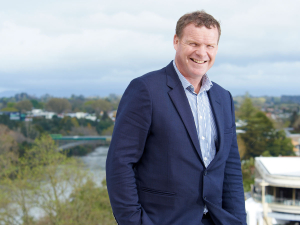Fonterra’s exit from Australia ‘a major event’
Fonterra’s impending exit from the Australian dairy industry is a major event but the story doesn’t change too much for farmers.
 Rabobank’s Todd Charteris says the bank’s sustainability efforts are largely focused on supporting its clients to reduce their emissions.
Rabobank’s Todd Charteris says the bank’s sustainability efforts are largely focused on supporting its clients to reduce their emissions.
Rabobank says climate change creates both risks and opportunities for the bank and its clients and that the food and agriculture sector needs to recognise the potential for both.
Rabobank NZ chief executive Todd Charteris notes that the transition pathway for New Zealand food and agriculture will ultimately be driven by market access considerations, give our agriculture sector's dependence on regional and global trade.
"Transitioning to lower emissions intensity farming systems can support market access and can lead to improved efficiencies, reduced input costs and better profitabiltiy.
"Where appropriate, it can also support the growth ambitions of our clients within the context of increasingly stringent regulatory standards.
"The transition is also essential to us collectively managing the risks that we all share."
Charteris made the comments at the launch of Rabobank NZ's latest Sustainability Report covering the bank's end-to-end ambition for sustainability and highlighting its progress in the 2023 calendar year.
Rabobank says that, with its own operational improvements only moving the emissions reduction needle so far, its sustainability efforts are largely focused on supporting its clients to reduce their emissions.
"It is in our interests to do our bit to minimise the impacts of climate change. For us that means supporting New Zealand's farmers and growers to balance the priorities of providing food security to a growing world with reducing the impact agriculture has on the environment," says Charteris.
"Within our Climate Statements, we have assessed the relative risks and opportunities for Rabobank across a number of climate scenarios. It was a hugely valuable exercise that is increasingly informing the decisions we make as a bank.
"Many of our food and agri clients are also looking at climate scenarios for their own businesses, and we strongly encourage our clients who haven't as yet done this, to go through the same exercise."
The Sustainability Report outlines several initiatives undertaken by the bank to help transition its business, as well as those of its clients, to more sustainable business practices. Key initiatives highlighted include:
The report follows the publication of its Climate Statements on 30 April which focus on climate risk and opportunities in Rabobank's New Zealand business.
"As with our first Sustainability Report last year, this report provides a comprehensive view of our support and contribution to the rural sector and it's transition toward a more sustainable future," says Charteris.
"The report focuses on Rabobank New Zealand's local environmental, social, and governance (ESG) strategies and initiatives, and how these are contributing to our global commitments."
The Meat Industry Association of New Zealand (MIA) today announced that Chief Executive Officer Sirma Karapeeva has resigned from the role.
The winners of the 2026 Hawke’s Bay/Wairarapa Dairy Industry Awards were announced at the annual awards dinner held at Copthorne Solway Park in Masterton on Thursday evening.
Environment Southland is welcoming this week’s decision by the Environmental Protection Authority (EPA) to approve the release of Blaptea elguetai, a leaf‑feeding beetle that will help control the highly invasive Chilean flame creeper.
This March, the potato industry is proudly celebrating International Women’s Day on 8 March alongside the International Year of the Woman Farmer, recognising the vital role women play across every part of the sector — from paddocks and packhouses to research, leadership, and innovation.
Fruit trader Seeka posted a record profit and returns to shareholders in 2025.
Recent weather events in the Bay of Plenty, Gisborne/Tairawhiti, and Canterbury have been declared a medium-scale adverse event.
OPINION: Staying with politics, with less than nine months to go before the general elections, there’s confusion in the Labour…
OPINION: Winston Peters' tirade against the free trade deal stitched with India may not be all political posturing by the…